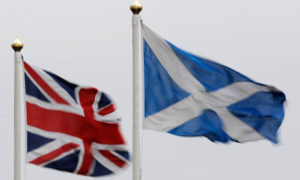L’ex primo ministro dell’Irlanda del Nord ha accusato i nazionalisti scozzesi di “fare violenza” all’identità delle persone con il loro tentativo di portare il Paese fuori dal Regno Unito

Il politico, che ha vinto un premio Nobel per il suo impegno nel processo di pace in Irlanda del Nord, ha parlato durante una manifestazione per l’Unione alla conferenza degli Scottish Conservative a Troon in Ayrshire. I politici conservatori di tutti i quattro paesi del Regno Unito si sono riuniti per far rimanere la Scozia all’interno dell’Unione.
Lord Trimble ha sostenuto che c’era un “componente comune” nell’identità nazionale delle persone provenienti da ogni parte del Regno Unito.
E ha dichiarato: “Devo dire ai nazionalisti scozzesi che lottando per un programma separatista, dicendo che si vuole staccare la Scozia e mantenere l’identità scozzese in un luogo separato, si sta facendo violenza ad una parte dell’identità di ogni scozzese, perché c’è una componente britannica nell’identità di ogni abitante della Scozia. E separarle è fare violenza al senso di identità proprio delle persone”.
Trimble detto che la popolazione in Irlanda del Nord è “preoccupata per quanto sta accadendo” in Scozia, con la volontà dell’amministrazione SNP di svolgere un referendum sull’indipendenza nell’autunno 2014.
Ha affermato che l’Irlanda del Nord era “uscita da una vasta campagna che aveva come scopo la rottura dell’Unione” (con il resto della Gran Bretagna). Ma ha spiegato che il progetto era fallito per degli sforzi della polizia e le forze armate, ma anche perché “abbiamo vinto con argomenti politici”.
Trimble, ex leader dell’Ulster Unionist Party ed ora Pari conservatore, ha detto al convegno: “Questo argomento politico è cruciale e l’argomento che abbiamo mostrato alla gente dell’Irlanda del Nord era tutto riguardante i vantaggi di essere nel Regno Unito, di come, facendo parte di un’unità più ampia, le proprie difficoltà potrebbero essere più facilmente conciliabili”. Ha detto che, proprio come l’Irlanda del Nord era rimasta con successo nel Regno Unito, lo stesso potrebbe avvenire in Scozia.
Humza Yousaf, parlamentare dell’SNP, in seguito ha risposto alle affermazioni, spiegando che Lord Trimble “sembra sapere molto poco della moderna identità scozzese, così come David Cameron”.
Ha poi aggiunto: “Questo è esattamente ciò che David Cameron e Ruth Davidson (la leader dei Conservatori scozzesi, Ndt) non hanno voluto – il loro tanto promesso caso positivo per l’Unione non è neppure sopravvissuto all’evento di lancio Tory, e ora si trova a brandelli. Ed è proprio questa sorta di negativo controsenso che è così dannoso per la campagna anti-indipendenza guidata dai Tories. Lord Trimble non potrebbe sbagliarsi di più sulla Scozia. L’indipendenza è l’opzione ampia, inclusiva e positiva per la Scozia, in cui la vasta gamma di identità che abbiamo nella nostra moderna – scozzese, britannica, pachistana, cinese, polacca, irlandese e molte molte altre – possono essere tutte celebrate”.
Trimble warns Scots against split
Lord Trimble said that every Scot had a “British component” in their national identity, and that to “separate that is to do violence to people’s own sense of identity”.
The politician, who won a Nobel Prize for his efforts in the Northern Ireland peace process, spoke out at a rally for the Union at the Scottish Conservative conference in Troon in Ayrshire. Tory politicians from all four countries in the United Kingdom joined together to make the case for Scotland staying in the Union.
Lord Trimble argued that there was a “common component” in the national identity of people from all parts of the UK.
And he stated: “I have to say to Scottish Nationalists that by fighting for a programme of separatism, saying that you want to take Scotland out and take the Scottish identity out into a separate place, you are doing violence to part of the identity of every Scotsman, because there is a British component in the identity of every Scotsman. And to separate that is to do violence to people’s own sense of identity.”
Lord Trimble said people in Northern Ireland are “concerned about what is happening” in Scotland, with the SNP administration planning on holding a referendum on independence in autumn 2014.
He said Northern Ireland had “come out of a huge campaign that was intended to break the Union”. But he said that had failed because of the efforts of the police and the armed forces, but also because “we won the political argument”.
Lord Trimble, former leader of the Ulster Unionist Party and now a Conservative peer, told the conference: “That political argument was crucial. And the argument we put to the people of Northern Ireland was all about the benefits of being in the United Kingdom, of how by being part of a larger unit our own particular difficulties could be more easily reconciled.” He said that just as the case for staying in the UK had been made successfully in Northern Ireland, the same could happen in Scotland.
SNP MSP Humza Yousaf said later that Lord Trimble “appears to know as little about modern Scottish identity as David Cameron does”.
He added: “This is exactly what David Cameron and Ruth Davidson didn’t want – their much-promised positive case for the Union hasn’t even survived the Tory launch event, and now lies in tatters. It is precisely this sort of negative nonsense that is so damaging to the Tory-led anti-independence campaign. Lord Trimble couldn’t be more wrong about Scotland. Independence is the broad, inclusive and positive option for Scotland, in which the wide range of identities we have in our modern nation – Scottish, British, Pakistani, Chinese, Polish, Irish and many, many more – can all be reflected and celebrated.”